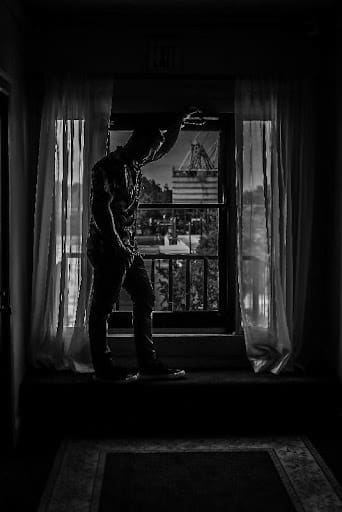NEW BLOOD: The Rebirth of Indie Horror A Conversation with Luke Kondor
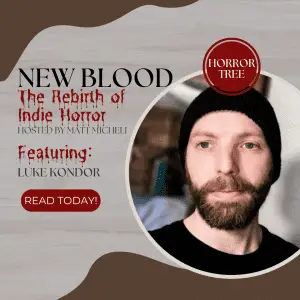 NEW BLOOD: The Rebirth of Indie Horror
NEW BLOOD: The Rebirth of Indie Horror
A Conversation with Luke Kondor
by Matt Micheli
These interviews are intended to be very candid and conversational. There is nothing off limits.
***
For Part 5 of NEW BLOOD, I have the pleasure of speaking to a man of many talents: author of horror and bizarro fiction, low-budget award-winning film maker, video-game writer, comic writer, owner of many cats (one of which is a dog), founder and producer of Hawk and Cleaver, and co-founder and host of the award-winning horror podcast The Other Stories.
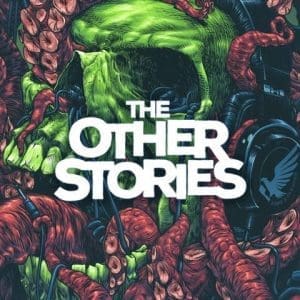
Luke, my man, it goes without saying (and with saying), thank you for sharing your time and brain with us, today! I’m a big fan of yours, as are many.
When I first spoke to you about the NEW BLOOD series and taking a very candid approach to the interview process, you asked “How candid? Do I need to get out the tape measure?”
We’ll come back to that… maybe. Ha.
Let’s get to it.
Where did you grow up and how would you describe your childhood?
Hola, Matt.
I grew up in a little mining town near Sherwood Forest. As such, there were lots and lots of trees. I spent some time chatting to them. They were pretty chill. I told them about Robocop and Masters Of The Universe and how my Gremlins 2 VHS had broke because I’d watched it too many times.
What else, what else… we had a lot of dogs. I fell out of a tree, broke my wrist, then fell out of a climbing frame, broke my other wrist. I played guitar. One of our cats got hit by a car and as we were burying its body, it turned up, like a ghost here to say goodbye to its flesh, but then we realized we were just burying some random dead cat that kinda looked like ours.
I will say this: trees are great listeners, like they’re born for it, despite their lack of hearing capabilities. Also, I don’t know if you’ve ever heard this, but cats have 9 lives. Just when you’ve finished mourning them, they love to come back, like a walking surprise act with the whole meowing and leg-rubbing bit. I have an eerily similar cat story, which makes me think, this may be more common than we once thought.
You mentioned playing guitar. Me being a moderately good recreational blues/rock guitar player, I have to ask: Do you still dabble, who is your favorite guitar player of all-time, and are you better at fingering (notes) with broken or healthy wrists?
I do dabble. In my teens, I fell in love with the groove metal and odd bluesy shredding of Dimebag Darrell. I still don’t think anybody can play like him, though many have tried. I think that’s what I look for in musicians. More so than the genre they play, but more in their uniqueness. Whether that’s Bon Iver’s cosmic warbling, Devin Townsend’s theatric doomsaying, or even Disasterpeace’s chiptune experiments. Recently, a friend recommended I check out some reviews on 카지노사이트 추천, and it reminded me of my search for unique musical talent. Just as I seek out artists who break the mold, these reviews helped me discover online casinos that stand out for their innovative features and exceptional user experiences. I like to find artists that don’t sound like anybody else.
Sidenote, I’m one of those writers who needs to have music on whilst they write. Always instrumental. For the last book I wrote it was all Miles Davis. For the current book, I’m listening to the soundtrack the Alex Garland movie, Men.
Well, you totally stole the thunder from my next question which was: what do you listen to (if anything) when you write? I haven’t seen Men but I do know of Miles Davis who was briefly mentioned in the movie Billy Madison—”If peeing your pants is cool, then consider me Miles Davis”—and who happens to be an iconic musician. I’m with you on music and definitely instrumental. The story/scene I’m attempting to write dictates what is playing while the music directly impacts where the story goes—the ol’ chicken and the egg thing perhaps. My go-to’s as of recent are Pandora stations This Will Destroy You and/or Timecop 1983. It really is a soundtrack for the story.
I hadn’t heard of Timecop1983 before right now. I like it.
Oh, for sure. I’m a fan of anything that brings back that dark, new wave feel with loads of synth.
What were your favorite things to do as a kid and how would your friends describe Luke in short pants?
At some point I started writing and drawing comics. I created this incredibly unique team of superheroes I called The Fox-Men, and they were led by a bald guy in a yellow wheelchair called Professor Fox who may or may not have telepathic powers. It was super original and totally unique.
My friends would describe Luke in short pants as a knot of computer cables… uneasy on the eyes, potentially useful if I could just untangle myself.
Hmmm… a knot of computer cables. For some reason, I think I agree with your friends. Ha. And The Fox-Men definitely has a ring to it. But I don’t know if the comic world is ready for something so cutting edge. I’d hold onto that one.
You can’t have it. It’s mine!
Before we delve further into comics, art, writing, all the other cool stuff, let’s talk creative influences for a moment, sticking with the short pants theme.
What was your favorite movie and why?
I would probably say Robocop… and in many ways it’s still a favourite. That movie teaches you everything you need to know about life. For a kid, it’s about a cool robot policemen who uses a sharp USB dongle to stab a bad guy. For an adult, it’s about how a privatised police force is happy enough to kill a man and use his body in the name of progress (and also there’s a guy who melts in toxic goo).
Favorite book (or story) and why?
The earliest one I can remember is Bad Bad Cats by Roger McGough. A poem collection. The author came to our school and I thought it was wild that authors were real people and not just names on book covers. There’s a poem in there about anthropomorphised cats that are gangster so how could I not fall in love with it. There was also a lot of Goosebumps and Star Wars Expanded Universe books.
Favorite song and why (don’t be embarrassed)?
I’m struggling to remember the music back then, but it would’ve likely been something on the Top Of The Pops at the time. Mambo No 5 or that maybe that song about being blue dabba dee dabba dye. Oh you know what… I think this was a little later but I remember having the CD single for the South Park song, Chocolate Salty Balls and the B-Side was Cartman singing Come Sail Away. I don’t know why but it really stuck with me.
Correct me if I’m wrong, but I believe all those mentioned won a Grammy, with the exception of Mambo No 5… Lou Bega got no respect, I tell you, and what an iconic song. Way better than that Macarena trash. But to each his own…
Of all the favorites you mentioned, how do they hold up now?
Robocop is a perennial banger. I can’t say I’ve read Bad Bad Cats for a good while now. It might be time for a re-read. Mambo No 5 probably wouldn’t sit well in today’s cultural climate but you can’t deny it is a tasty jam.
Hmmm… I wonder if Bad Bad Cats helped spawn your love of cats? Speaking of, tell us about your current pet/pets. What are their names and personality traits?
We had ten border collies in the house when I was a kid and it was awesome. These days I’ve only got the one dog, Alaska, and the one cat, Oscar.
Alaska is a handful of fluff and Oscar is a real piece of work. I mean, I love him. He’s been with us as we’ve moved all over the country. He’s a comrade in the daytime and an utter arse in the nighttime. He never lets me sleep. I actually can’t remember the last time I slept through the night. It inspired a story called My Cat Hates Me, which is up on The Other Stories.
I do recall that story. It was quite entertaining.
Thanks very much.
Let’s get into the meat: writing and podcasting.
Writing video games, writing comics, writing scripts, writing books… do you follow the same process or do you take a completely different approach for each?
Video games — I use Twine to write the interactive elements and have to constantly consider how I’m putting agency in the players’ hands. Also programming is fun as hell.
Comics — I like to draw the comics (badly) in a notebook. It’s a purely visual medium that requires you to consider how each sequential beat will occur on the page and how you’ll draw the reader’s eye from one panel to the next. It’s difficult to take this into account if you’re only working from inside your writing software.
Books — Currently I like to think of it less like writing a book and more like sculpting it. The first draft is all about digging up the raw materials and it’s only in the rewriting that the book starts to takes shape.
I can only speak to books on this, having not written for games/comics, but everyone has their own take on the process. Everybody has their own way of creating art, which makes art/writing, whatever your outlet may be, deeply personal. I’d say there is nothing more personal than creation.
True. And the process can change from project to project. Just when you think you’ve figured out how you write a book you get to the book where that process stops working.
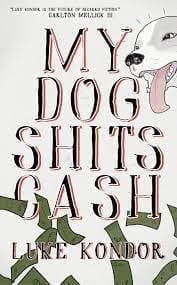
Your newest book My Dog Shits Cash… Where and when did the idea for this book hit you, and what were you doing at that very moment?
I honestly have no idea where the idea came from. I believe the title came first, and then the blurb, and then finally the 40k book. Stories can be impenetrable things. Sometimes they require an ungodly amount of brainstorming, others need you to figure out a character or a line of dialogue first, and sometimes all you need is the title.
I’ve found that in writing books or songs (way back when), the best ones are the ones where you are simply a vessel—the words/scenes just flow through your fingertips—many times spawned from nothing more than a title or a first line. My Dog Shits Cash is one helluva title to start with!
You can’t have it. It’s mine!
Let’s move onto the award-winning podcast you co-founded and host: The Other Stories.
I love everything about this podcast: the stories, the production quality, the lengths, the host’s soothing voice… I also enjoy the fact that y’all interact with fans through FB and movie clubs, contests, etc.. Y’all are very active in the horror/dark fiction community.
Where did the idea for the podcast come from?
Back in 2015 I’d been podcasting for a little while and working as a freelance podcast editor. Around that same time I started writing with the Hawk & Cleaver guys. We were looking for ways to get our work out there and were also looking for a monthly writing exercise. Initially the plan was to make a monthly ebook but then we thought it’d be awesome to turn it into a podcast instead.
Who set the wheels in motion?
An otherworldly cosmic spacehawk called Kez.
Or as I like to call this cosmic spacehawk: Kez the rejector. Ha.
He goes by many names.
Did you see it growing to what it is now with over 10k active listeners?
I secretly believe everything I do will be successful in some way or another. Unfortunately most of the time I’m an idiot and I’m completely wrong. I think we were lucky, though. We managed to ride a wave when horror podcasts rose in popularity.
I’m hoping this wave continues, and I think it is.
One of my goals coming back into writing was to have a story featured on The Other Stories. I have won 2 FB contests and have had your lovely voice read 2 shorts (flash-fiction) on the special edition episodes. I am yet to accomplish getting an entire episode but have received some good feedback from Kez (the editor), so there’s still hope. What would you tell submitting writers to help them better their chances of landing an episode?
- Write to the more obscure themes. A theme like Possession is quite wide-reaching and will get a TON of submissions. However something like Octopuses, which is quite specific, won’t get anywhere near as many subs.
- Write to be remembered. Write the kind of story that’s going to tattoo a mark on the listener’s brain. Whether that’s with an awesome twist, a unique character, or an interesting vibe.
- Write the kinds of stories that would light you up with jealousy if you read if it was written by somebody else.
Everyone, take note!
You had some podcasting experience going into The Other Stories. What’s something you’ve learned over the years that would’ve made the process that much easier in the beginning…?
For the first couple of years, we operated on a week by week basis, sometimes desperately recording and editing episodes the day before they were due for release. It was a stressful time for all involved.
Since then, we’ve spent a significant amount of time building our systems (mostly in Notion) to make sure we’re always ahead of our production schedule, always know who’s working on what and when, and we can spot potential issues well before they arise.
So… my advice for newbie podcasters. Find cool people to work with, build systems to ease the stress, and work well in advance.
What’s next for fans of The Other Stories? Any top-secret, extra-spooky or weird, exciting stuff headed our way?
Right now, we’re finishing up production on this year’s Halloween special — The Toy Factory, a staticky nightmare about spooky toys, quantum-entanglement, and mysterious trees.
Nightmares, mysterious trees, spooky toys, the quantum realm… sounds like a banger! Here’s a little teaser.
What do you want to see more of or less of as Indie Horror becomes more prominent in the writing/reading world?
I can’t say I’m that involved in the indie horror scene as a whole. I definitely feel like I’m outside looking in, and from what I can see… indie horror is healthier than ever! Having said that, I wouldn’t say no to seeing more great horror podcasts out there.
Spoken like a true podcaster. Ha.
I’ll challenge you a little on the “not that involved” comment. You were one of the first people I thought of when coming up with the New Blood idea… I feel The Other Stories is doing something really special within the indie horror scene, offering an exceptional outlet for new and known voices with absolute top-notch quality. Then you have the Hawk and Cleaver Studio offering services to help get writers, designers, and podcasters started and on the right track. All’s I’m asking, is that you give yourself a little more credit.
Sorry I couldn’t hear your compliment. I’m listening to Timecop1983.
I want to go back to writing for a second: what is your most valuable piece of writing advice to young writers who prefer the dark and scary? And please, no “write what you know” fluff. Give us something real they can really sink their teeth into.
I don’t know if I have any single piece of advice but here’s a couple that I find helpful.
- If you find yourself lost in the weeds with the story, unsure where it’s going, try to reduce it down to its barest components — the character, the setup, and the punchline. Those two-sentence horror stories are great examples of this. This might be a little formulaic for some but can be a guiding light for the lost.
- I’d suggest trying to relate the internal demons of a character to the external demons in the story. There should be a reason why this specific horror is happening to this specific character. As with all advice, take the above with a smidgen of salt. It’s your story. Own it.
Great advice!
What is the last Indie Horror book you read? Care to comment?
Sweet Story by Carlton Mellick III. Carlton’s the godfather of bizarro fiction and his books are horrific, lovely, and extremely Moorish.
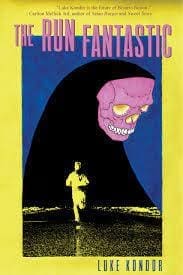 Your book The Run Fantastic was my first venture into bizarro (fun book by the way!). It had a Beetlejuice vibe to it with definite elements of horror throughout. Thinking now, Beetlejuice splits the line of horror and bizarro if it were to be released today, both genres complimenting each other very well.
Your book The Run Fantastic was my first venture into bizarro (fun book by the way!). It had a Beetlejuice vibe to it with definite elements of horror throughout. Thinking now, Beetlejuice splits the line of horror and bizarro if it were to be released today, both genres complimenting each other very well.
Beetlejuice was a formative experience for me.
As we wrap up, let’s get personal. If you could change anything from your past—anything at all—what would that be and how would that change affect today?
I wouldn’t have put that jam sandwich in Dad’s VHS player.
Live and learn, I suppose.
Time for my favorite question (take your time): what do loved ones put on your tombstone if there was no word limit; how will you be remembered?
Wait… I’m going to die?
First off, yes—you are going to die at some point. Now, let’s untangle the “knotted computer cables” a little here. I’m not letting you off that easy. How do you want to be remembered, and will that be an honest depiction of who you were as a person?
Hmm. I really only want to do two things in my life. Tell stories that are enjoyed all over the world… and help shine a light on the under-appreciated storytellers out there.
Only two things… As far as I can see, you are making those things happen. And thank goodness you didn’t talk about helping the earth or being a good husband or dad. Ain’t nobody got time for that nonsense. Ha.
 Last but not least, where can people find the great Luke Kondor, social media, etc., where can they find your books, and where can they listen to The Other Stories?
Last but not least, where can people find the great Luke Kondor, social media, etc., where can they find your books, and where can they listen to The Other Stories?
The Other Stories is available on any and all podcast platforms or by heading to the website, www.theotherstories.net. You can find more of me and my work at LukeKondor.com or any social media platform as @Lukeofkondor.
Luke, thank you for taking the time to amaze and entertain us and thank you for your support of indie horror story tellers. Hawk and Cleaver, The Other Stories, and the community y’all have established is a great outlet and was a big motivator for me once I started writing again. Thank you for sharing your wealth of knowledge with the Horror Tree fans!
Thanks for having me, Matt. You’ve been great!
On October 24th, join us for Part 6 of New Blood where we talk to the D of D&T. And be prepared for some horror sprinkled with a little southern charm. Thank you for your support of indie horror, and as always, share, share, share away!
- About the Author
- Latest Posts
Matt Micheli is a writer out of New Braunfels, TX. He has several fiction and non-fiction pieces featured in various magazines and is a multi-contributor/reviewer/columnist at This Is Horror. Most recently, his work can be found in horror anthologies: Executive Dread and Night Terrors vol 18. His new horror novella The White is slated for release in December of 2022 by D&T Publishing which will be followed by his second horror novella Two Minutes with the Devil tentatively scheduled for the Summer of 2023.

